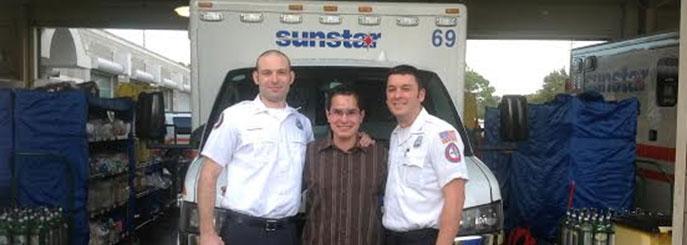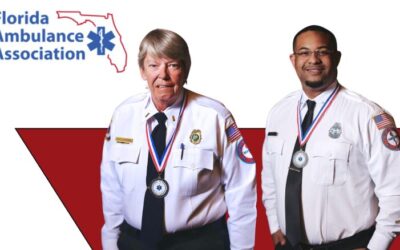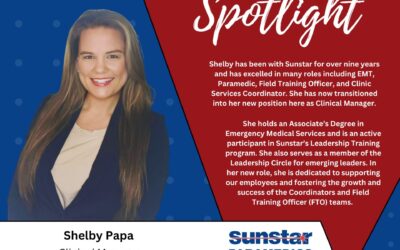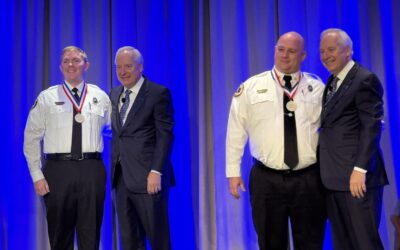It was November 2013, and EMT Jay Messier and Paramedic Brent Jackson were seated at the Thanksgiving table with Ian Ondina and his family. Before the meal began, Ian offered a Thanksgiving prayer. “He said, ‘I just want to start off by thanking you guys for saving my life,’” recalls Messier.
In the time that Messier and Jackson had worked as a team, no one else had ever thanked them
“Most people don’t get to hear that ever – someone praying to God, thanking him for us saving his life,” says Messier. “It was unreal.”
But Messier and Jackson had played a crucial part in Ian’s miraculous recovery and the teen wanted them to know how grateful he was for that.
About eight months before, on March 9, 2013, Messier and Jackson had come to Ondina’s aid after his ATV crashed into a tree, resulting in a traumatic brain injury that left him in critical condition. The call notes they received were ominous: teenager into a tree, unresponsive, barely breathing. When Jackson and Messier arrived at the scene in Tarpon Springs, they saw fire and rescue responders gingerly placing Ian’s battered body onto a backboard.
They knew with the severity of Ian’s injuries, he needed rapid transport by Bayflite in order to have any chance at survival. Jackson and Messier got Ian in the ambulance and headed toward the landing zone. As Messier concentrated on the drive, Jackson inserted IVs and began breathing for Ian. By the time they reached the landing zone, Ian’s teeth were clenched tight due to his brain injury, and he was suffering from a collapsed lung, requiring medications, intubation, and a needle chest decompression – all before he reached the hospital. Ian was airlifted to Bayfront Medical Center in critical condition.
Messier and Jackson say that the extent of Ian’s injuries were as grave as any they’d seen before. “It’s probably the worst trauma call we ever ran,” says Jackson. “I was a combat medic in Iraq, and I’ve been doing this for a while. I’ve seen some pretty bad injuries. I never would have thought that he’d make it.” Adds Messier, “Brent and I talked about the call after, and we both agreed that he wasn’t going to live.”
Ian survived, enduring ten surgeries over the following four months, including five craniotomies. He had suffered a severe traumatic brain injury and numerous fractures to his skull and face – in fact too many to count, according to the initial assessment by the trauma doctor at the hospital.
Messier says that Ian’s accident really hit home with him, both because he himself rides ATVs and because Ian was so young – only a teenager. He and Jackson wanted to know how their young patient was doing after he reached Bayfront. “You’re always curious about how your patients are doing, because you run so many during a shift, and often you don’t hear anything about them after. When you see a young man like Ian with a full life, you like to know how things are going,” says Jackson.
Messier made several attempts to find out about Ian’s condition, but when patients are in the hospital for trauma, the medical staff refers to them by pseudonyms instead of their real names so as to protect their privacy. During those first few weeks of Ian’s hospitalization, no one would tell Messier the code name he had been assigned.
But Messier persevered, and was finally permitted to meet Ian’s family about two months after the accident. “I met the family on the last night they all got to spend together in the hospital. It was a pretty surreal feeling when I walked in there. They were so thankful,” he remembers.
Jackson had been kept informed about Ian’s recovery through Messier until his own first meeting with Ian and his mother, Dennise. That meeting happened almost by coincidence. Ian and his mother stopped at Sunstar’s hub one day just as Jackson was clocking in for his shift. “I didn’t even recognize him,” says Jackson, because he had made such progress since the accident. “I gave him a big hug and said ‘it’s so great to see you.’”
Ian and his mother visited Sunstar Headquarters not long after; and this time, Ian was able to see the very same ambulance that had transported him on the night of his accident. “He was carried into the ambulance the first time, but was able to walk into it the second time. It’s not often that people get the chance to do that,” notes Jackson.
Nearly a year has passed since Ian’s accident. After four months of hospitalization at Bayfront, Ian and his family relocated to Atlanta, GA, where the teen underwent an additional three months of intensive therapy at the Shepherd Center. The family finally returned home last fall. Ian continues to receive outpatient therapy locally to help him on his path to recovery.
Jackson and Messier continue their relationship with Ian and his family. In fact, they just had lunch with Ian a couple of days ago. It was a milestone for the teen; it was the first time he had been able to leave home since the accident except for his therapy appointments.
Messier had taken a photo of himself and Ian during their first visit together at the hospital. That day at lunch, he compared the photo he had from a year ago with the teen’s appearance now. He was amazed at the difference. “The progression he’s made since that day is pretty incredible,” says Messier.
Ian’s mother Dennise Ondina couldn’t agree more and says, “Jay and Brent played a crucial part in this miraculous journey. The experience that brought them together that night has connected them forever. How can thank you ever be enough?”
Charlene Cobb, Sunstar’s community outreach coordinator, praises the care and concern that Jackson and Messier have shown their young patient over the past year. “They are extraordinary caregivers with such compassion. They carried this patient in their thoughts all this time” she says. But Jackson and Messier are modest about it. “It’s our job,” says Jackson, and they love it. “You’ve got to love the job to be able to do it.”
Need Support?
Ian is still on the road to recovery, but he and his family are already working to help other people. They have started a support group for young survivors of traumatic brain injury who are 18 to 25 years old. If you or a loved one has suffered a traumatic brain injury, and feel disconnected from your social group, there is now support for you. For more information, Email: boostgroup.tampabay@gmail.com



